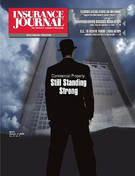Carriers Eyed as Income Source
South Carolina legislators want to make insurance carriers pay for more investigators and prosecutors to fight insurance fraud under a proposal suggested by Rep. Daniel L. Tripp, R-Greenville. Legislators also suggest tougher penalties to help fight insurance fraud, which has risen by about 61 percent in South Carolina in five years.
Tripp met in Colum-bia with nearly 50 concerned industry officials, state regulators and prosecutors to brainstorm on improvements to existing laws, which many deem too soft, and to discuss ways to fund more manpower, including a possible assessment on insurance carriers.
Tripp, along with nearly a dozen lawmakers, put together a similar bill last year that ultimately failed after industry in-fighting over who should shoulder the burden. The legislation stalled over differences over how assessments on insurance policies would be levied, but despite last year’s failure, a rallying cry is being raised again for a renewed effort to introduce similar legislation in the coming year. Tripp said he hopes to reintroduce new legislation this month.
Last year’s proposed bill would have assessed carriers about $2.5 million to fund more investigators and prosecutors and create a civil enforcement unit under the Department of Insurance. Trey Walker, a spokesman for the attorney general’s office, said $750,000 would have gone to his department to fund about a half-dozen additional prosecutors in an office in which the budget has been slashed by 35 percent in recent years because of state budget cuts.
“We support any efforts to help fight insurance fraud,” David Reddick, National Association of Mutual Insurance Companies state affairs manager said. “We’ll be anxious to see if Attorney General Henry McMaster brings forth any legislative initiatives to help increase his staff to fight fraud in South Carolina.”
According to a report in the Post and Courier, insurance executives and state officials are increasingly worried that South Carolina is becoming a magnet for insurance scammers, driving insurance costs even higher.
While the number of fraud complaints have increased in South Carolina, the number of state employees fighting fraud has decreased from 20 to four including two agents, one prosecutor and one assistant.
“If we can fight fraud, it’s good for the carriers, it’s good for the consumers, it’s good for everyone except those who commit fraud,” Tripp said. “At the end of the day, we want to figure out how best to fight fraud.”
Insurance fraud can range from something as simple as under-reporting the number of miles you drive in your car to save a few bucks to more complex schemes such as businesses intentionally misclassifying the type of work employees do to avoid paying the much higher premiums required for more dangerous jobs.
Last year, there were 844 complaints of fraud in South Carolina, totaling about $3.7 million in estimated losses. National estimates put the loss to fraud between $80 billion and $120 billion annually, which ultimately gets passed on to the consumers to the tune of an extra $1,030 more per family each year in higher premiums.
A key component to fight fraud, discussed during the meeting, is increas-ing the number of investigators and prosecutors assigned to the state’s insurance fraud division at the S.C. Attorney General’s Office. That office, which has only one prosecutor and two State Law Enforcement Division agents, only has a budget of about $300,000 to investigate and prosecute as many as 600 criminal cases a year.
“We have two people in South Carolina doing what other states have 30 people doing,” Lynn Szymoniak, a lawyer whose firms specialize in fighting fraud for the insurance industry in Florida and South Carolina said. “It doesn’t matter how good your people are. You have to have a larger staff. There are too many people out there committing fraud.”
Topics Legislation Fraud South Carolina
Was this article valuable?
Here are more articles you may enjoy.


 Beazley Agrees to Zurich’s Sweetened £8 Billion Takeover Bid
Beazley Agrees to Zurich’s Sweetened £8 Billion Takeover Bid  Chubb Posts Record Q4 and Full Year P/C Underwriting Income, Combined Ratio
Chubb Posts Record Q4 and Full Year P/C Underwriting Income, Combined Ratio  Allstate CEO Wilson Takes on Affordability Issue During Earnings Call
Allstate CEO Wilson Takes on Affordability Issue During Earnings Call  India’s GIFT City Attracts Lloyd’s and Other Global Reinsurers, Sources Say
India’s GIFT City Attracts Lloyd’s and Other Global Reinsurers, Sources Say 


